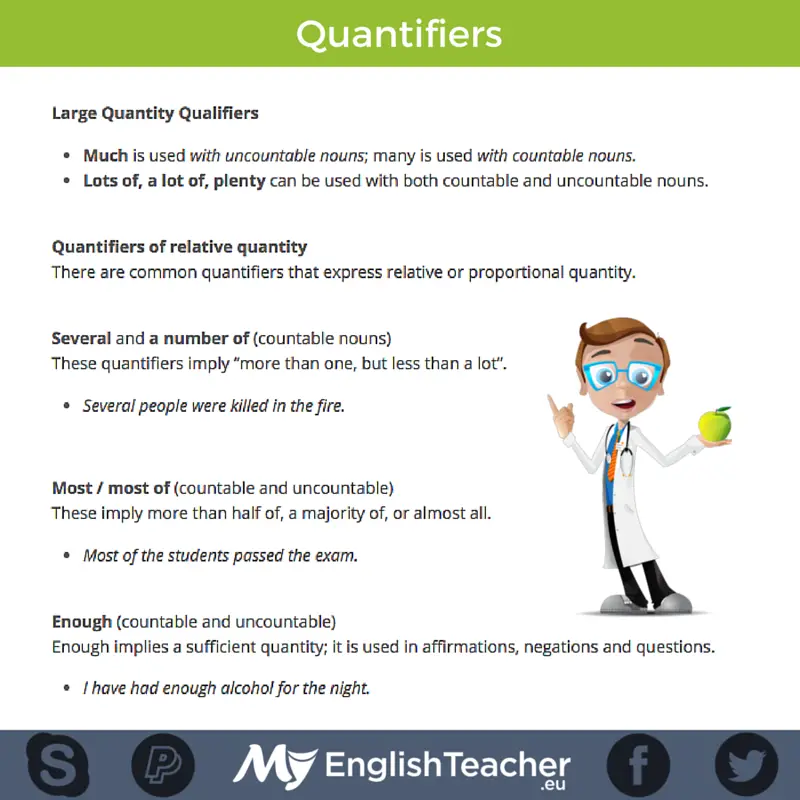
What are Quantifiers?
Words used to state quantity or amount of something without stating the actual number.
Quantifiers answer questions such as “How many?” and/or “How much?”
Quantifiers can be used with plural countable nouns and uncountable nouns.
Examples of Plural Countable nouns:
- There are at least 40 Kebab diners in Madrid.
- Megan took a lot of photographs when she visited the Tower of London
- Your books are on the dining table.
- How many candles are on Michelle’s birthday cake?
- You have several paintings which are worth millions.
- There are fierce looking wild boars running around the neighbourhood.
Examples of Uncountable nouns:
- There is so much smoke being emitted from the manufacturing plants.
- Please help yourself to some cheese.
- There is no more milk in the refrigerator.
- You seem to have a high level of integrity.
- Please look after your personal equipment.
- Please get rid of the garbage.
Quantifiers must agree with the noun. There are 3 main types of quantifiers. Quantifiers that are used with countable nouns, quantifiers that are used with uncountable nouns and lastly quantifiers that are used with either countable nouns or uncountable nouns.
Recommended for you:
How many is several?
Difference between British and American Uncountable Nouns
List of Words Without Plural Form (Uncountable Nouns)
Is ”Person” an uncountable noun?
English Adverbs of Quantity (List)!
Fewer vs Less with 17 Examples
Quantifiers can be further subdivided into Large, Relative and Small quantities.
Large Quantity Qualifiers
- Much is used with uncountable nouns; many is used with countable nouns.
- Lots of, a lot of, plenty can be used with both countable and uncountable nouns.
Quantifiers of relative quantity
There are common quantifiers that express relative or proportional quantity.
Several and a number of (countable nouns)
These quantifiers imply “more than one, but less than a lot”.
- Several people were killed in the fire.
Most / most of (countable and uncountable)
These imply more than half of, a majority of, or almost all.
- Most of the students passed the exam.
Enough (countable and uncountable)
Enough implies a sufficient quantity; it is used in affirmations, negations and questions.
- I have had enough alcohol for the night.
Recommended for you:
Allot – A lot – Alot – Lots
Can vs Able To!
Best English Grammar and Spelling Checkers Online
few – a few
Small quantity quantifiers:
few, a few, little, a little, not many, not much, a small number of, etc.
Little, a little, not much are used with uncountable nouns
Few, a few, not many are used with countable nouns
** A few/a little – means that there are not a lot of something, but there is enough.
- There are a few oranges. There are enough oranges. There are a few people at the meeting.
- There are enough people to hold a meeting.
- There are not a lot people, at the meeting, but there are enough.
- I know a little English. I know enough English to manage. I have a little money. I will have enough to buy lunch.
*few/little – means that is not enough of something.
- There are few apples. There are not enough apples.
- There are few people. There are not enough people at the meeting. We can’t hold a meeting, because there are not enough people.
- There is little money. We can’t buy a lot of expensive food.
- They know little English. They can’t get around very well. They don’t know enough English to manage.
Recommended for you:
112 Phrases for Saying Thank You in Any Situation
Difference between MOST and MOST OF
Difference between ‘few’ and ‘a few’?
There’re only a few people, …….. ? a) are there, b) aren’t there



























